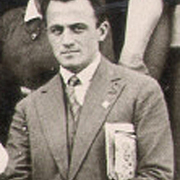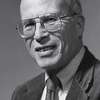Emanuel Ringelblum (1900–1944)
Autor de Notes from the Warsaw Ghetto
Sobre El Autor
Nota de desambiguación:
(yid) VIAF:71410723 (YIVO)
Obras de Emanuel Ringelblum
Etiquetado
Conocimiento común
- Nombre canónico
- Ringelblum, Emanuel
- Nombre legal
- Ringelblum, Emmanuel
- Otros nombres
- Рингельблюм, Иммануэль
- Fecha de nacimiento
- 1900-11-21
- Fecha de fallecimiento
- 1944-03-07
- Género
- male
- Nacionalidad
- Poland
- País (para mapa)
- Pologne
- Lugar de nacimiento
- Buchach, Galicia
Buczacz, Poland - Lugar de fallecimiento
- Warsaw, Poland
- Lugares de residencia
- Buchach (in Galicia ∙ now in Ukraine)
Warsaw Ghetto
Warsaw, Poland - Educación
- Warsaw University (PhD)
- Ocupaciones
- historian
politician
writer
social worker
archivist - Relaciones
- American Jewish Joint Distribution Committee
Lewin, Abraham (colleague) - Organizaciones
- American Jewish Joint Distribution Committee (1930-1938)
Institut YIVO de recherche juive (Chercheur) - Biografía breve
- Emanuel Ringelblum was born to a Jewish family in Buczacz, Poland, in the eastern Austro-Hungarian Empire (now Ukraine). From a young age, he was active in politics and was a member of the leftist Jewish movement called Po’alei Zion (Workers of Zion). He earned a doctoral degree in history from Warsaw University in 1927 with a dissertation on the history of Jews in Warsaw in the Middle ages. In 1932, he began working for the American Jewish Joint Distribution Committee (JDC) to assist Jews in Poland targeted by pogroms, and later Polish refugees from Nazi Germany. He served as the leader of Aleynhilf, which later became a key relief organization in the Warsaw Ghetto. By 1939, he had published 126 scholarly articles. During World War II, Dr. Ringelblum and his family were confined in the Warsaw Ghetto. There he led a secret operation to document the Ghetto by collecting and preserving diaries, letters, newspaper articles, reports, notes, posters, and decrees. His secret archive also included descriptions of the destruction of Jewish ghettos in other parts of Nazi-Occupied Poland, and the atrocities at extermination camps such as Treblinka and Chełmno. On the eve of the destruction of the Warsaw Ghetto in the spring of 1943, the archive was placed in three milk cans and several metal boxes, to be buried in the cellars of Warsaw buildings. Dr. Ringelblum and his family escaped and went into hiding with others on the non-Jewish side of the city. However, a year later, they were discovered by the Nazis and murdered, along with two of their Polish rescuers, Mieczysław Wolski and Janusz Wysocki. The fate of Dr. Ringelblum's archives is only partially known. One of the sites of the boxes was uncovered in 1946 and salvaged by conservators. In 1950, two milk cans were found. The third has yet to be located. The archive materials, along with Emanuel Ringelblum's own written chronicles, constitute the most comprehensive and valuable source of information known regarding the daily lives, struggles, and sufferings of Jews in German-Occupied Poland during the Holocaust. Some of Dr. Ringelblum's writings were translated into English and published by Yad Vashem in 1974 in a volume called Polish-Jewish Relations During the Second World War.
- Aviso de desambiguación
- VIAF:71410723 (YIVO)
Miembros
Debates
Group tags en YIVO Encyclopedia (marzo 2012)
Reseñas
Listas
También Puede Gustarte
Autores relacionados
Estadísticas
- Obras
- 11
- Miembros
- 276
- Popularidad
- #84,078
- Valoración
- 4.0
- Reseñas
- 5
- ISBNs
- 19
- Idiomas
- 6
- Favorito
- 1














